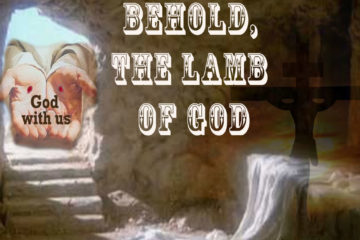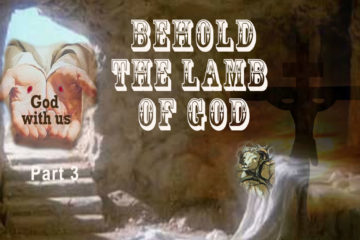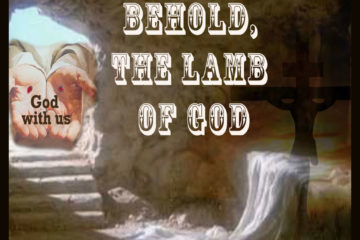
Is It Foolishness or Faith? Part 2
Perhaps the title would better serve this developing study by extending it to say, “Is it foolishness or Faith … to believe God?” Belief in God is a major tenet of our Christian faith. Faith is something God has revealed to us through the lives of great biblical leaders. One of those leaders is Abraham whose mature faith is the focus of the twenty-second chapter of Genesis. However, his faith, like ours, had many testings.
In Part 1 of this series, the following statements were made: “The New Testament is concealed in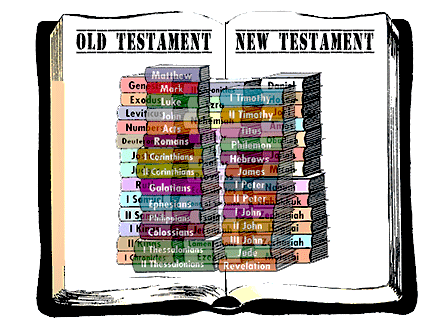 the Old Testament. The Old Testament is revealed in the New Testament.” Genesis 22 is an important example to illustrate these two statements. For example, the first two verses of Genesis 22 often bring questions, confusion, and even criticism to the minds of many readers because they haven’t studied both Old and New Testament Scriptures regarding the lives of Abraham and Sarah:
the Old Testament. The Old Testament is revealed in the New Testament.” Genesis 22 is an important example to illustrate these two statements. For example, the first two verses of Genesis 22 often bring questions, confusion, and even criticism to the minds of many readers because they haven’t studied both Old and New Testament Scriptures regarding the lives of Abraham and Sarah:
And it came to pass after these things, that God did tempt Abraham, and said unto him, Abraham: and he said, Behold, here I am. And he said, Take now thy son, thine only son Isaac, whom thou lovest, and get thee into the land of Moriah; and offer him there for a burnt offering upon one of the mountains which I will tell thee of. Genesis 22:1-2
Listen in on how the news media might portray what God told Abraham to do as recorded in Genesis 22:1-2.
 God recently tempted a senior citizen, one who is over one hundred years old, to sacrifice his only son that he dearly loved. However, court records indicate that Mr. Abraham had another older son named Ishmael. Yet, God not only called Isaac Abraham’s only son, but He stated Isaac was the one Abraham loved. Furthermore, God told Mr. Abraham to leave his house ASAP and travel on a slow-moving beast of burden to embark on what would be a three-day arduous journey over rough terrain with this only son Isaac whom he loved. Mr. Abraham was not even given clear directions where he was to go to perform this sacrifice. The only detail given to Mr. Abraham, if one could consider that a detail, was that the destination was upon one of the distant mountain ranges and that the specific place would, at some undetermined time, be revealed.
God recently tempted a senior citizen, one who is over one hundred years old, to sacrifice his only son that he dearly loved. However, court records indicate that Mr. Abraham had another older son named Ishmael. Yet, God not only called Isaac Abraham’s only son, but He stated Isaac was the one Abraham loved. Furthermore, God told Mr. Abraham to leave his house ASAP and travel on a slow-moving beast of burden to embark on what would be a three-day arduous journey over rough terrain with this only son Isaac whom he loved. Mr. Abraham was not even given clear directions where he was to go to perform this sacrifice. The only detail given to Mr. Abraham, if one could consider that a detail, was that the destination was upon one of the distant mountain ranges and that the specific place would, at some undetermined time, be revealed.
Was God tempting Abraham?
The call upon Abraham’s life to offer his son as a burnt sacrifice was not a torturous task to tempt Abraham to sin. First, child sacrifice was abhorred by God. Secondly, God never tempts anyone to sin. Instead, He allows or often brings circumstances into peoples’ lives to develop their faith. So why then does the Scripture say, And it came to pass after these things, that God did TEMPT Abraham? Genesis 22:1? What will be confirmed from the ensuing study of Scripture is that this “tempting” was not to entice Abraham to sin. It was, instead, a special culminating event in Abraham’s life—to prove his faith.
Biblical terms must be defined from the Bible.
An understanding of how the word tempt is used contextually throughout the Bible is necessary; otherwise, the entire study of Genesis 22:1-19 could be skewed. The New Testament writer James gives important relevant information to correctly interpret this tempting of Abraham:
Let no man say when he is tempted, I am tempted of God: for God cannot be tempted with evil, neither tempteth he any man.” James 1:13
My brethren, count it all joy when ye fall into divers temptations; Knowing this, that the trying of your faith worketh patience. James 1:2-3
Consider the writings of James above to determine God’s purpose in directing Abraham to take Isaac and offer him for a burnt offering. According to the Scriptural definition of tempt, it was to try or prove Abraham’s faith.
God’s timing is not according to our timing.
 Was Abraham a man of faith? Had Abraham matured in his walk with God enough to trust God in all things? The timing of this directive is important not only for Abraham but for our learning. For whatsoever things were written aforetime were written for our learning, that we through patience and comfort of the scriptures might have hope. Romans 15:4
Was Abraham a man of faith? Had Abraham matured in his walk with God enough to trust God in all things? The timing of this directive is important not only for Abraham but for our learning. For whatsoever things were written aforetime were written for our learning, that we through patience and comfort of the scriptures might have hope. Romans 15:4
This ultimate test, to sacrifice Isaac, was not given to Abraham when he was first called by God to leave his family and country. When a study is made of the building of the faith of Abraham, God’s timing of this pinnacle “tempting” of Abraham’s faith becomes clear. Abraham, for many years, like many of us, did not fully trust God. Thus, he did not obey God’s Word. When we do the same thing, we hinder the maturing of our faith. God’s Word and principles, as recorded in the Bible, are as much for the building of our faith today as they were when given verbally to Abraham. Every word of God is pure.
There are many warnings and directives in the Bible. Some are self-explanatory; others require study to understand. Mature Christians know they can trust God; yet, even they often go against what is clearly stated in the Bible. Perhaps they do so because their faith, like Abraham’s, is still weak. They, at the moment, do not understand why God’s Word must always supersede their ways, even when they do not understand why. However, any rebellion against the Word of God is sin; and a lifestyle of sin will keep a person from living eternally with the LORD.
Spiritual growth is stunted by sin.
There are Christians who (as did Abraham for a quarter of a century) are also stunting their spiritual growth. For example, many Christians refuse to believe God is serious when He warns that anyone who continually, day after day, repeats the same sin will not inherit the kingdom of God. One list of such sins is given in First Corinthians 6:9-10:
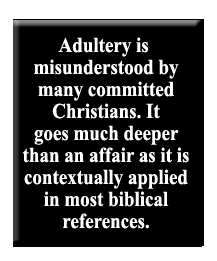 Know ye not that the unrighteous shall not inherit the kingdom of God? Be not deceived: neither fornicators, nor idolaters, nor adulterers* nor effeminate, nor abusers of themselves with mankind, Nor thieves, nor covetous, nor drunkards, nor revilers, nor extortioners, shall inherit the kingdom of God.
Know ye not that the unrighteous shall not inherit the kingdom of God? Be not deceived: neither fornicators, nor idolaters, nor adulterers* nor effeminate, nor abusers of themselves with mankind, Nor thieves, nor covetous, nor drunkards, nor revilers, nor extortioners, shall inherit the kingdom of God.
*Beware, the sin of adultery is greatly misunderstood as only applying to those who have an affair. However, the teachings on adultery in the New Testament Scriptures are focused on those who have married a second spouse while they (or the one they marry) have a living one-flesh (covenant) husband or wife from whom they are legally divorced. This also includes those who have never married but marry someone who has a living covenant spouse: Whosoever putteth away his wife, and marrieth another, committeth adultery: and whosoever marrieth her that is put away from her husband committeth adultery. Luke 16:18 See also Romans 7:2-3 and I Corinthians 7:39, et al.
God’s grace never excuses or covers sin: For the grace of God that bringeth salvation hath appeared to all men, Teaching us that, denying ungodliness and worldly lusts, we should live soberly, righteously, and godly, in this present world. Titus 2:11-12
Many of us, like Abram, are not ready (spiritually mature) to receive God’s blessings.
God’s plan was, through Abraham, to bless not only Abraham but also his descendants—including you and me—with many blessings: And I will make of thee a great nation, and I will bless thee, and make thy name great; and thou shalt be a blessing: And I will bless them that bless thee, and curse him that curseth thee: and in thee shall all families of the earth be blessed. Genesis 12:2-3
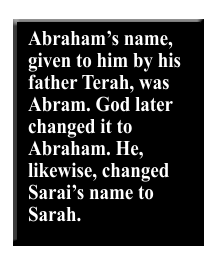 Abraham, however, like many of us, was not ready to receive God’s blessings for many years after God first spoke to him. It took Abraham a quarter of a century to learn what it meant to believe, trust, and follow God. His unbelief (refusal to fully obey God) was a major roadblock to his faith. Genesis 12 gives a glimpse of Abraham’s disobedience. Some of his pitfalls are similar to ones many Christians throughout the ages have made as they, too, have faced challenges in their lives that have been “tempting” them.
Abraham, however, like many of us, was not ready to receive God’s blessings for many years after God first spoke to him. It took Abraham a quarter of a century to learn what it meant to believe, trust, and follow God. His unbelief (refusal to fully obey God) was a major roadblock to his faith. Genesis 12 gives a glimpse of Abraham’s disobedience. Some of his pitfalls are similar to ones many Christians throughout the ages have made as they, too, have faced challenges in their lives that have been “tempting” them.
Abraham’s name given to him by his father, Terah, was Abram. It was later changed to Abraham by God; and, likewise, God changed Abram’s wife’s name from Sarai to Sarah.
Now the LORD had said unto Abram, Get thee out of thy country, and from thy kindred, and from thy father’s house, unto a land that I will shew thee. Genesis 12:1
As you study Genesis 12:1, consider the following four sentences:
- Every word of God is pure … (Psalm 12:6)
- Every word of God is written for a purpose.
- The New Testament is concealed in the Old Testament.
- The Old Testament is revealed in the New Testament.
Did you notice the word had in Genesis 12:1? Now the LORD had said unto Abram … A New Testament Scripture passage gives insight into the importance of the helping verb had in Genesis 12:1. In Acts 7:2-53, Stephen, a man full of faith and of the Holy Ghost, “preached” to a gathering of wicked religious leaders whom he called: Ye stiffnecked and uncircumcised in heart and ears … Acts 7:51 After Stephen’s lengthy discourse, these leaders stoned him to death. Stephen had not only quoted from the Old Testament, but he, through the Holy Ghost, also gave additional information about Abraham not specifically recorded in the Old Testament.
And he [Stephen] said, Men, brethren, and fathers, hearken; The God of glory appeared unto our father Abraham, when he was in Mesopotamia, before he dwelt in Charran [Harran/Haran], And said unto him, Get thee out of thy country, and from thy kindred, and come into the land which I shall shew thee. Acts 7:2-3
The LORD did not tell Abram why he was to:
- Get out of his homeland,
- Separate from his relatives, and
- Go into a land that God would show him.
These were very serious, life-changing commands from God, especially in the culture in which Abram was reared. Family unity was strong and important. As a study of other Scriptures will reveal, Abram made some very serious mistakes while his faith in God’s Word was being developed. He, like many of us, was rebellious, impatient, and even what could be considered foolish.
Abram disobeyed each of the three specific directives which God gave to him, and he violated several other principles throughout the many years that his faith in God was maturing. These included lying about his relationship to Sarai, his wife, not once but twice, and putting her in harm’s way to selfishly protect his own life. He also moved to Egypt during a famine which  ultimately laid the groundwork for birthing a rebellious son “out of wedlock,” with a surrogate mother from Egypt. It’s evident that Abram, for many years, had more faith in his own plan for his life than in God’s. It took him a quarter of a century to “die to self” before he was ready to totally trust God: Oh how great is thy goodness, which thou hast laid up for them that fear thee; which thou hast wrought for them that trust in thee … Psalm 31:19 It’s easy for us to see the errors of others; however, I often must say to the LORD: Examine me, O LORD, and prove me; try my reins and my heart. Psalm 26:2
ultimately laid the groundwork for birthing a rebellious son “out of wedlock,” with a surrogate mother from Egypt. It’s evident that Abram, for many years, had more faith in his own plan for his life than in God’s. It took him a quarter of a century to “die to self” before he was ready to totally trust God: Oh how great is thy goodness, which thou hast laid up for them that fear thee; which thou hast wrought for them that trust in thee … Psalm 31:19 It’s easy for us to see the errors of others; however, I often must say to the LORD: Examine me, O LORD, and prove me; try my reins and my heart. Psalm 26:2
Why God—have you allowed this to happen?
Why would God give Abram these, seemingly harsh, unexplainable directives; that is, to, without any explanation, ask him to leave his homeland and family and strike out into the unknown and then let there be a famine in the very land to which God led him? Were these directives unjust? God’s message seemed to be an unusually difficult message to receive. The family unit in Biblical times tended to be more cohesive than families are today. They established strong property boundaries in which generations lived together. However, the “Why?” comes into better focus when both Old and New Testament Scriptures are studied and especially when the religious beliefs practiced in the home in which Abram was reared are factored in.
God’s directive for Abram to leave his homeland and separate from his relatives is partially tied to a New Testament biblical principle stated in Second Corinthians 6:14: Be ye not unequally yoked together with unbelievers: for what fellowship hath righteousness with unrighteousness? and what communion hath light with darkness?
Abram was birthed into a pagan, Gentile family.
Abram’s initial calling to follow God was when he was living in Ur. His home was headed by his Gentile father, Terah, who was an idol worshiper: And Joshua said unto all the people, Thus saith the LORD God of Israel, Your fathers dwelt on the other side of the flood [the river Euphrates] in old time, even Terah, the father of Abraham, and the father of Nachor: and they served other gods. Joshua 24:2
 The first record of Terah having become a father was when he was 70. His family tree includes three sons and a daughter: Abram, Nahor, Haran, and Sarai. Abram married his half-sister: And yet indeed she is my sister; she is the daughter of my father, but not the daughter of my mother; and she became my wife. Genesis 20:12 See table of Terah’s family.
The first record of Terah having become a father was when he was 70. His family tree includes three sons and a daughter: Abram, Nahor, Haran, and Sarai. Abram married his half-sister: And yet indeed she is my sister; she is the daughter of my father, but not the daughter of my mother; and she became my wife. Genesis 20:12 See table of Terah’s family.
Did Abram really marry his sister?
God created Adam and Eve and told them to multiply: And God blessed them, saying, Be fruitful, and multiply … Genesis 1:28 For it to be possible for their children to also multiply, it was necessary for relatives to marry. This continued to be the practice in the days of Abram. However, shortly before Israel occupied Canaan, God put into place a prohibition against marrying close relatives. See Leviticus 18 and 20.
Geographical and cultural factors influenced Abram.
 Abram’s father, Terah, established his home in Ur, a grossly pagan city. This Mesopotamian city is located near the Persian Gulf, at the southern base of the Euphrates River (the southern tip of modern-day Iraq). Ur’s sister city was Haran (also spelled Harran and Charran). Haran was located 600 miles north of Ur at the upper tip of Mesopotamia, and west of the Euphrates River (in modern-day Turkey).
Abram’s father, Terah, established his home in Ur, a grossly pagan city. This Mesopotamian city is located near the Persian Gulf, at the southern base of the Euphrates River (the southern tip of modern-day Iraq). Ur’s sister city was Haran (also spelled Harran and Charran). Haran was located 600 miles north of Ur at the upper tip of Mesopotamia, and west of the Euphrates River (in modern-day Turkey).
Religion was the most important linkage between cities that existed in the ancient world. 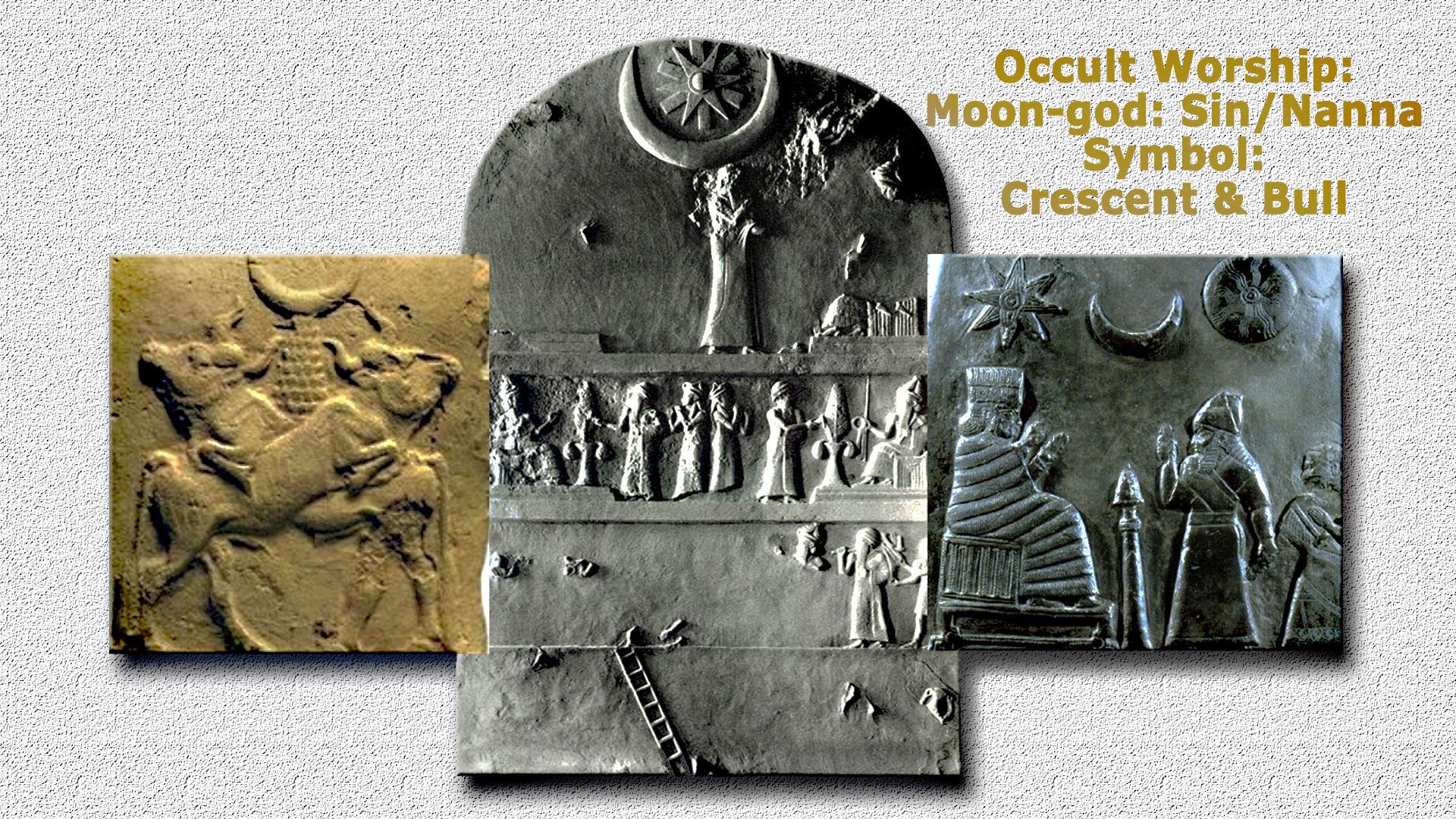 Religion was a major factor in making Ur and Haran sister cities. The people of each of these cities worshipped the same deity: their moon-god, Sin or Nanna. (The two names were used interchangeably.) Their religious logo or symbol was the bull and crescent moon. As recorded in Romans 1:22-25, they were people who worshipped birds and four-footed beasts; that is, they worshipped the creation instead of the Creator.
Religion was a major factor in making Ur and Haran sister cities. The people of each of these cities worshipped the same deity: their moon-god, Sin or Nanna. (The two names were used interchangeably.) Their religious logo or symbol was the bull and crescent moon. As recorded in Romans 1:22-25, they were people who worshipped birds and four-footed beasts; that is, they worshipped the creation instead of the Creator.
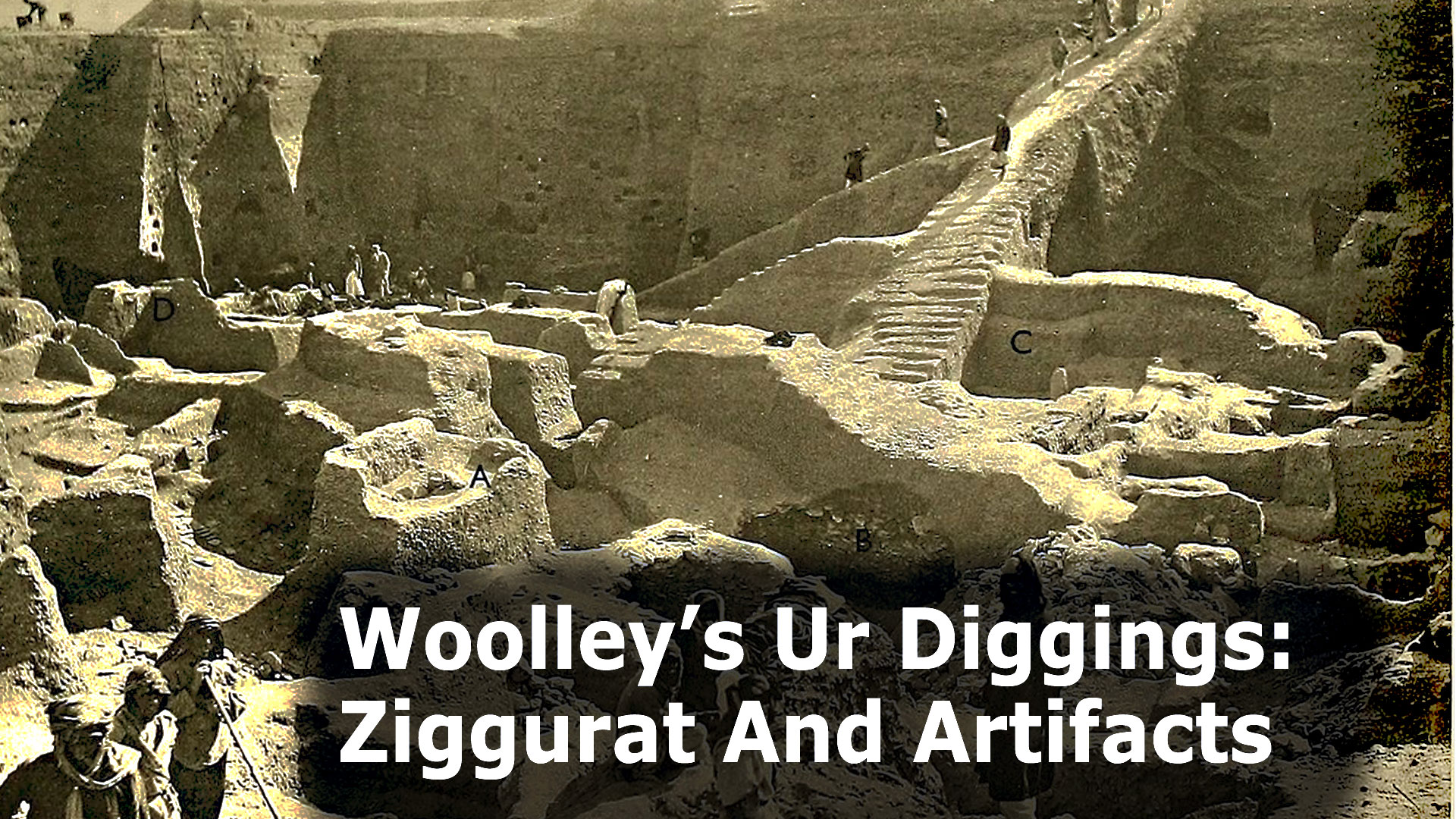 Ur has been a sought-after site for archeological studies. Thousands of cuneiform tablets and artifacts have been unearthed at Ur by many explorations, especially those led by the famed archeologist Sir Leonard Woolley
Ur has been a sought-after site for archeological studies. Thousands of cuneiform tablets and artifacts have been unearthed at Ur by many explorations, especially those led by the famed archeologist Sir Leonard Woolley
Evidence of Ur’s political environment and its prosperous economic status, as well as its pagan 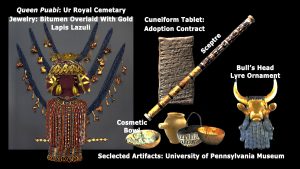 religious systems, have been preserved in thousands of cuneiform tablets; and in pottery, jewelry, musical instruments, and carvings. These have been unearthed from tombs, homes, a palace, and Ur’s famed occult ziggurat. These artifacts bring to light this city’s once-held affluent standard of living and pagan worship practices. Its unearthed tablets also include a wealth of information about its occult death pits and deviant practices including Ur’s deep-seated moon-god worship
religious systems, have been preserved in thousands of cuneiform tablets; and in pottery, jewelry, musical instruments, and carvings. These have been unearthed from tombs, homes, a palace, and Ur’s famed occult ziggurat. These artifacts bring to light this city’s once-held affluent standard of living and pagan worship practices. Its unearthed tablets also include a wealth of information about its occult death pits and deviant practices including Ur’s deep-seated moon-god worship
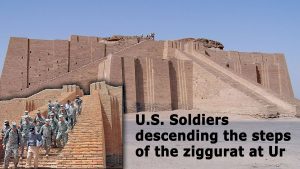 One tablet gives construction details and a line drawing of Ur’s unearthed pagan, religious ziggurat. Man’s purpose behind ziggurats was to connect earth with heaven. The many steps, typical in the construction of ziggurats, are reflective of the belief that heaven could be reached by human efforts. This was a continuation of the same occult practice God abhorred which was practiced by people at the Tower of Babel (Genesis 11). The image at left shows the reconstruction of Ur’s famed ziggurat. Ziggurats were a major influence on the culture in which Abraham lived with his father and family in Ur.
One tablet gives construction details and a line drawing of Ur’s unearthed pagan, religious ziggurat. Man’s purpose behind ziggurats was to connect earth with heaven. The many steps, typical in the construction of ziggurats, are reflective of the belief that heaven could be reached by human efforts. This was a continuation of the same occult practice God abhorred which was practiced by people at the Tower of Babel (Genesis 11). The image at left shows the reconstruction of Ur’s famed ziggurat. Ziggurats were a major influence on the culture in which Abraham lived with his father and family in Ur.
Ur and the surrounding areas were rich in petroleum deposits with vast amounts of bitumen or pitch which was used in their jewelry, musical instruments, and in the construction and waterproofing of Ur’s ziggurat. Bricks were held together and waterproofed with pitch. You may recall that God instructed Noah to waterproof the ark with pitch: Make thee an ark of gopher wood; rooms shalt thou make in the ark, and shalt pitch it within and without with pitch. Genesis 6:14
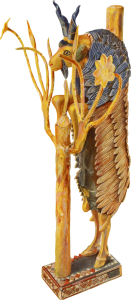 Among the thousands of artifacts unearthed in Ur by Woolley, the most famous is what he named, The Ram in a Thicket. He felt it was reflective of the ram in the thicket in Genesis 22:13. This magnificent piece of art was constructed of gold, copper, shell, lapis lazuli, and red limestone.
Among the thousands of artifacts unearthed in Ur by Woolley, the most famous is what he named, The Ram in a Thicket. He felt it was reflective of the ram in the thicket in Genesis 22:13. This magnificent piece of art was constructed of gold, copper, shell, lapis lazuli, and red limestone.
God chooses us not because of our family background.
God didn’t choose Abram because he was already spiritually faithful to Him; because he was an accomplished musician; because he was a writer, or a successful entrepreneur. Instead, the LORD knew that Abram had a heart that could be transformed. This should be encouraging to those who feel overwhelmed because of their current or past challenges, history, or family background. Abram was born and reared in Ur. His father was a heathen idol worshipper; yet, Abraham, through God’s “temptings” and life’s challenges, over the course of many years, learned the rewards of total faith in the Word of God. This once pagan Gentile became the first Hebrew, the father of the faithful, and God called him a friend … the seed of Abraham my friend. Isaiah 41:8
God also said of Abraham: For I know him, that he will command his children and his household after him, and they shall keep the way of the LORD, to do justice and judgment; that the LORD may bring upon Abraham that which he hath spoken of him. Genesis 18:19
Half obedience doesn’t count with God.
God’s first calling for Abram to follow him was … when he was in Mesopotamia, before he dwelt in Charran. The command from God was to … Get thee out of thy country, and from thy kindred, and come into the land which I shall shew thee. Acts 7:2-3
Abram responded to God with only partial faith.
And Terah took Abram his son, and Lot the son of Haran his son’s son, and Sarai his daughter in law, his son Abram’s wife; and they went forth with them from Ur of the Chaldees, to go into the land of Canaan; and they came unto Haran, and dwelt there. And the days of Terah were two hundred and five years: and Terah died in Haran. Genesis 11:31-32
Abram STARTED on the journey to go into the land of Canaan; however, he did not leave his family. God, of course, did not intend that Abram was to leave his wife. Sadly, when Abram and his family reached Haran, instead of passing through, they stayed there for many years—until Terah died at age 205.
After the death of Terah, Abram left Haran; however, again, he was only partially obedient to God: So Abram departed, as the LORD had spoken unto him; and Lot went with him: and Abram was seventy and five years old when he departed out of Haran. Genesis 12:4 Once again, Abram only partially obeyed God. God directed him to get out of his country and to leave his relatives. Yet, Abram disobeyed by taking his nephew Lot with him. Lot’s travel with Abram created several major challenges in Abram’s life that would have been totally avoided had Abram fully obeyed God.
A major hurdle for Abram and Sarai was exposed early.
God let those of us who came after Abram in on what would be a major hurtle for both Abram and Sarai: But Sarai was barren; she had no child. Genesis 11:30 This vital fact was repeated twice: (1) Sarai was barren (2) she had no child. We must not miss this.
 Not bearing children in Biblical times was a horrific curse. It was a shame—a humiliation for a wife to have no children. Family assets were passed through the children. Children defended and took care of their elderly parents. Children are meant to be prized gifts from the LORD, not for what they might do for the parents, but because of the many blessings of birthing and rearing children in the fear and admonition of the LORD. However, we know there are many who cannot and do not bear children. This is not meant to imply they have disobeyed God or are under some kind of curse. However, in the context of Abram and Sarai’s lives, Sarai’s barrenness was a major disappointment and hurdle in Abram’s and Sarai’s lives that must be understood biblically. As will be discovered, it was not a normal barrenness.
Not bearing children in Biblical times was a horrific curse. It was a shame—a humiliation for a wife to have no children. Family assets were passed through the children. Children defended and took care of their elderly parents. Children are meant to be prized gifts from the LORD, not for what they might do for the parents, but because of the many blessings of birthing and rearing children in the fear and admonition of the LORD. However, we know there are many who cannot and do not bear children. This is not meant to imply they have disobeyed God or are under some kind of curse. However, in the context of Abram and Sarai’s lives, Sarai’s barrenness was a major disappointment and hurdle in Abram’s and Sarai’s lives that must be understood biblically. As will be discovered, it was not a normal barrenness.
Lo, children are an heritage of the LORD: and the fruit of the womb is his reward. As arrows are in the hand of a mighty man; so are children of the youth. Happy is the man that hath his quiver full of them: they shall not be ashamed, but they shall speak with the enemies in the gate. Psalm 127: 3-5
Why then, did God make sure we understood that Sarai was barren?
Is it Foolishness or Faith: Part 3
It’s in Part 3 of this study that more will be discussed about the barrenness of Sarai as well as the ongoing issues Abram created because of his disobedience to the LORD. It will become clear why God told Abram not to take his family, including his nephew Lot, with him to the “promise land” and how this rebellious act on Abram’s part invited trouble. Some of the other choices Abram made out of the will of God brought about strife that exists even today.
Yet, we must be ever mindful that this is all leading up to the reason why God sent Abraham and Isaac to Mt. Moriah. In the end, it’s not how we start the race but how we finish: For what saith the Scripture? Abraham believed God and it was counted to him for righteousness. Romans 4:3 Not only is Abraham’s faith, especially as exhibited in Genesis 22, important for every believer to understand, but it is also important to study how this great man of faith struggled doing things his way until he learned, without question, to believe and follow God.
If you have questions or would like prayer, please contact us.
If you haven’t read Part 1 and would like to do so, click on this link. Additional information on the study of Abraham is available in our Bible Study series. Click here for Bible Study 2 and here for Bible Study 3.
In Christ’s Service,
Judith Brumbaugh
Founder/President
Restoration Of The Family, Inc.
